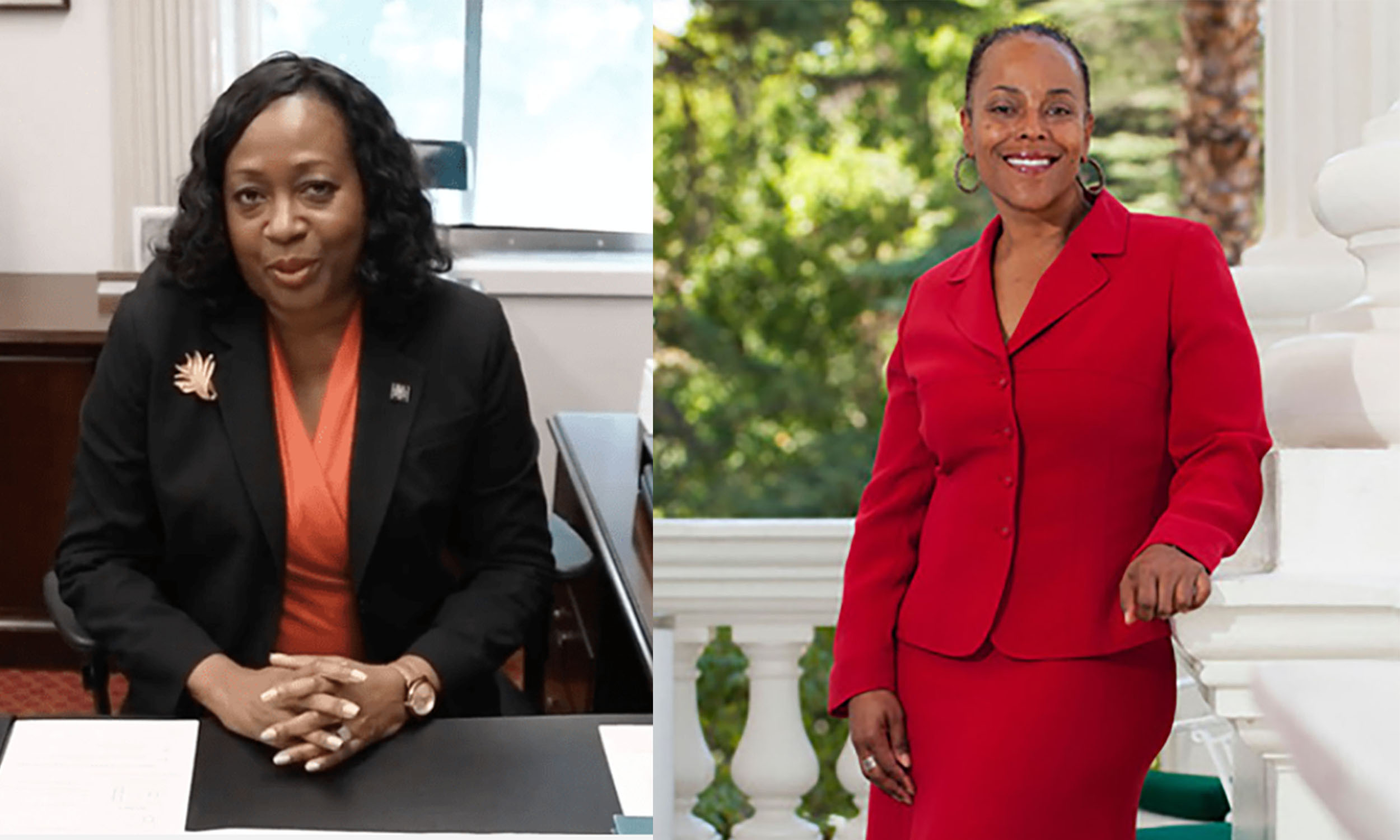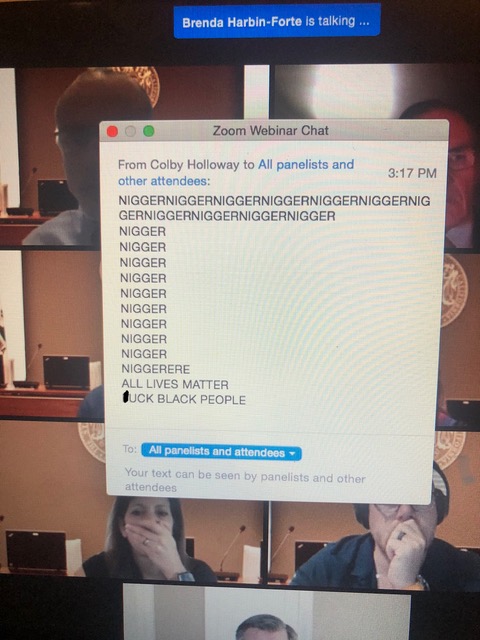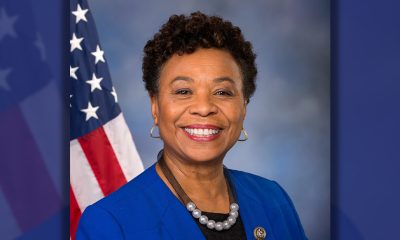#NNPA BlackPress
California State Bar Shaken by Personnel Issues Involving Two Black Women

In less than one month, the State Bar of California has been roiled in high-level personnel snafus involving two prominent Black California women.
In July, the California State Bar offered Fredericka McGee, a respected California legislative attorney, the position of executive director. Then, in August, the organization which serves as an administrative arm of the State Supreme Court and is charged with protecting the public interest, reportedly rescinded that offer without an explanation. McGee has been a licensed attorney with the Bar for almost 30 years.
Then, last week, Debbie Manning, a member of State Bar’s 13-member board — the only African American serving on the governing body — abruptly resigned midway through her term. Manning was appointed to a four-year term by the state Senate in 2018.
Manning, a “non-attorney” member, was appointed to a four-year term by the State Senate in 2018. Previously, Manning was not only the first Black woman to join the Legislature’s Office of the Senate Sergeant-at-Arms in 1977, she was also the first woman to serve as Senate Chief Sergeant-at-Arms. She held that position from 2014 until 2017.
Manning’s resignation came just one week after the Bar met to discuss the hiring of the next executive director with extended public comment in support of McGee after which the board went into closed session but did not report any decision or action. Manning did not give a reason for leaving.
Powerful Support: State Leaders Defend McGee at Board Meeting
At the Friday, Sept. 4 State Bar public board meeting, supporters urged the body to reconsider its decision and renegotiate with McGee for the executive director position. That meeting was delayed when an individual wrote the “n” word several times and other profanity directed toward Black people in the Zoom meeting chatbox, which caused the meeting to be delayed for almost an hour.

Screenshot of the State Bar Zoom Board meeting September 4, 2020
Despite the delay, a diverse group of people spoke at the meeting in support McGee — supporters say a testament to her rapport with lawmakers; attorneys of all colors and backgrounds; business leaders; members of the African American community; leaders in major service organizations, and more. Among them were representatives of the California Association of Black Lawyers, SEIU, Planned Parenthood and the ACLU.
Assemblymember Shirley Weber (D-San Diego), speaking on behalf of the California Legislative Black Caucus (CLBC), was the first speaker to address the board of trustees.
Weber said, speaking on accounts of published reports, that McGee’s situation is one of the reasons the CLBC talks about the “increase of representation of people of color, particularly African Americans in all aspects.”
Weber said the Bar’s alleged withdrawal “brought tremendous concern” to members of the CLBC.
“(McGee) had accepted the position, was making efforts to move, change her residency, and basically move around for this position, and then all of sudden the position was withdrawn,” Weber said. “We stand united in requesting that you provide the state bar the best leader as possible, as we’ve always found that to be of the character and qualifications of Ms. Fredericka McGee.”
In closing, Weber referenced the constitutional relationship between the Legislature and the State Bar. The Legislature annually authorizes a “fee bill” to allow the Bar to assess lawyers’ licensing fees, according to Ed Howard, a Sacramento public interest lobbyist and long-time State Bar watcher.
A History of Turmoil and Mismanagement
Over the years, the State Bar has been under scrutiny for some of its practices and the way its leaders have managed the organization. In 1998, then Gov. Pete Wilson vetoed a bill that would’ve authorized the agency to charge lawyers in the state annual licensing fees to fund the Bar.
A layoff of two-thirds of the Bar’s staff members was hanging in the balance and the group’s attorney discipline system temporarily shut down for lack of funds. Those issues were only resolved in 1998 after the state’s Supreme Court intervened.
Gov. Arnold Schwarzenegger’s administration vetoed another fee authorization bill, Senate Bill 641, in 2009. Schwarzenegger justified his action by basing it on a state audit that discovered irregularities in enforcing attorney discipline, embezzlement of $675,000 by a former employee, and prohibited disclosure of the rating of a potential candidate for the appellate bench.
In a written message, the governor said the Bar’s scandals “cannot continue with business as usual.”
“As the organization charged with regulating the professional conduct of its members, the conduct of the State Bar itself must be above reproach,” Schwarzenegger stated. “Regrettably, it is not.”
In 2016, after the California Legislature did not pass a Bar dues bill, and the state’s Supreme Court had to step in to authorize the agency to collect interim dues. The American Bar Association reported on Nov. 16, 2016, that both Legislative houses were at odds about the bar’s “reform measures,” introduced by the Assembly. The issue was about a study of whether the bar should break into two parts, splitting the Bar’s attorney discipline abilities from its trade organization tasks.
Last month, the Assembly and the Senate passed Assembly Bill (AB) 3362, a bill that would again authorize the Bar to collect fees from California attorneys and restrict its board of trustees from discussing issues about the Bar’s exams administration in seclusion. At the moment, Gov. Gavin Newsom is reviewing the bill.
At the September 4th board meeting, Fabian Núñez, a former Assemblymember, who represented the 46th District in Los Angeles County and served as speaker of the Assembly from 2004 to 2008, highlighted McGee’s professionalism and praised her “level of dignity,” depth of knowledge,” ability to “build relationships,” and “certainty of purpose.”
Núñez said that within his nearly five-year tenure, McGee was his general counsel and he watched her juggle and manage legal matters of the Assembly, the rules committee, and judiciary issues.
“It’s something unmatched in California,” Núñez said of McGee’s skill set. “Quite frankly, it’s unique because she also possesses the skills that are so important when you are managing a large organization such as the State Bar.”
Gov. Newsom’s former Legislative Affairs Secretary, Anthony Williams also said in support of McGee, “When I heard that she was a candidate for the executive director for the State Bar, I was pleased and proud not only as a lawyer but also as a Californian who knows the important role that the State Bar plays in public protection and administration of justice. Fredericka understands that. I hope that you reconsider it, such a sensitive, personnel decision,” Williams said.
The board of trustees’ duties includes developing the guiding policies and principles of the Bar. It comprises five lawyers appointed by the California Supreme Court, two lawyers appointed by the legislature, and six non-attorney members (four named by the governor).
The State Bar’s Board of Trustees Responds
The governing body’s chairperson Alan Steinbrecher pointed out that the makeup of the state bar is one of diversity and inclusion and at the end of the meeting sought to provide examples of two prior African American State Bar executive directors.
“In my work with the state bar’s leadership team and with staff, I know that the commitment to diversity and inclusion is widely shared throughout the organization,” Steinbrecher said. “As our former executive director said, ‘We want diversity and inclusion to be built in and not built on.’ I also want to note that contrary to some comments we’ve received, the state bar has been previously led by two capable and talented African American women that served as executive directors.”
Leah T. Wilson, another African American woman, served as executive director for two years before she surprised some when she left the role on Jan. 17 of this year.
The Hon. Judy Johnson, also a Black woman, was the State Bar’s executive director from May 2000 to January 2011. Johnson is now a Superior Court Judge for Contra Costa County, first appointed by Gov. Jerry Brown in 2012.
Before entering a closed session, the Bar’s board of trustees addressed the concerns of McGee’s supporters.
“There has been some speculation about a particular candidate who has been considered for the executive director’s position,” Steinbrecher said. “We are not in the position to respond to specifics reported in the press because the executive director’s selection process is a confidential, personnel matter.”
The executive director of the Bar leads the senior management team responsible for various programs. The position requires the executive director to answer to the board of trustees and advance its policies.
McGee was in the process of transitioning out of her role as vice president of California government affairs and operations for the American Beverage Association (ABA). She worked out of ABA’s office in Sacramento.
In addition, McGee is also the founding president of the Black Youth Leadership Project, Inc., a non-profit organization that offers interactive legislative and debate programs to African American high school students throughout California.
Alice Huffman, the President of the California State National Association for the Advancement of Colored People, said in a written statement dated Sept. 3 that McGee “has been recognized for her exemplary service by a multitude of organizations throughout the state and has a stellar reputation in the legislative and legal community.”
“The California NAACP remains ready to stand with the California State Bar as we ensure a fair and transparent legal system at this pivotal time in our country as we address issues of social justice,” Huffman said in a statement “Again, I wholeheartedly support the California State Bar in its efforts to complete the contractual process that started with Ms. McGee.”
#NNPA BlackPress
Beloved Actor and Activist Louis Cameron Gossett Jr. Dies at 87
NNPA NEWSWIRE — Louis Gossett Jr., the groundbreaking actor whose career spanned over five decades and who became the first Black actor to win an Academy Award as Best Supporting Actor for his memorable role in “An Officer and a Gentleman,” has died. Gossett, who was born on May 27, 1936, in Brooklyn, N.Y., was 87. Recognized early on for his resilience and nearly unmatched determination, Gossett arrived in Los Angeles in 1967 after a stint on Broadway.
The post Beloved Actor and Activist Louis Cameron Gossett Jr. Dies at 87 first appeared on BlackPressUSA.

By Stacy M. Brown
NNPA Newswire Senior National Correspondent
@StacyBrownMedia
Louis Gossett Jr., the groundbreaking actor whose career spanned over five decades and who became the first Black actor to win an Academy Award as Best Supporting Actor for his memorable role in “An Officer and a Gentleman,” has died. Gossett, who was born on May 27, 1936, in Brooklyn, N.Y., was 87. Recognized early on for his resilience and nearly unmatched determination, Gossett arrived in Los Angeles in 1967 after a stint on Broadway.
He sometimes spoke of being pulled over by law enforcement en route to Beverly Hills, once being handcuffed to a tree, which he remembered as a jarring introduction to the racial tensions of Hollywood. In his memoir “An Actor and a Gentleman,” Gossett recounted the ordeal, noting the challenges faced by Black artists in the industry. Despite the hurdles, Gossett’s talent shone brightly, earning him acclaim in groundbreaking productions such as “A Raisin in the Sun” alongside Sidney Poitier. His Emmy-winning portrayal of Fiddler in “Roots” solidified his status as a trailblazer, navigating a landscape fraught with racial prejudice.
According to the HistoryMakers, which interviewed him in 2005, Gossett’s journey into the limelight began during his formative years at PS 135 and Mark Twain Junior High School, where he demonstrated early leadership as the student body president. His passion for the arts blossomed when he starred in a “You Can’t Take It With You” production at Abraham Lincoln High School, catching the attention of talent scouts who propelled him onto Broadway’s stage in “Take A Giant Step.” His stellar performance earned him the prestigious Donaldson Award for Best Newcomer to Theatre in 1952. Though initially drawn to sports, Gossett’s towering 6’4” frame and athletic prowess led him to receive a basketball scholarship at New York University. Despite being drafted by the New York Knicks in 1958, Gossett pursued his love for acting, honing his craft at The Actors Studio under the tutelage of luminaries like John Sticks and Peggy Fury.
In 1961, Gossett’s talent caught the eye of Broadway directors, leading to roles in acclaimed productions such as “Raisin in the Sun” and “The Blacks,” alongside legends like James Earl Jones, Cicely Tyson, Roscoe Lee Brown, and Maya Angelou. Transitioning seamlessly to television, Gossett graced small screens with appearances in notable shows like “The Bush Baby” and “Companions in Nightmare.” Gossett’s silver screen breakthrough came with his role in “The Landlord,” paving the way for a prolific filmography that spanned over 50 movies and hundreds of television shows. From “Skin Game” to “Lackawanna Blues,” Gossett captivated audiences with his commanding presence and versatile performances.
However, his portrayal of “Fiddler” in Alex Haley’s groundbreaking miniseries “Roots” earned Gossett critical acclaim, including an Emmy Award. The HistoryMakers noted that his golden touch extended to the big screen, where his role as Sergeant Emil Foley in “An Officer and a Gentleman” earned him an Academy Award for Best Supporting Actor, making him a trailblazer in Hollywood history.
Beyond the glitz and glamour of Hollywood, Gossett was deeply committed to community activism. In 1964, he co-founded a theater group for troubled youth alongside James Earl Jones and Paul Sorvino, setting the stage for his lifelong dedication to mentoring and inspiring the next generation. Gossett’s tireless advocacy for racial equality culminated in the establishment of Eracism, a nonprofit organization dedicated to combating racism both domestically and abroad. Throughout his illustrious career, Gossett remained a beacon of strength and resilience, using his platform to uplift marginalized voices and champion social change. Gossett is survived by his children, Satie and Sharron.
The post Beloved Actor and Activist Louis Cameron Gossett Jr. Dies at 87 first appeared on BlackPressUSA.
#NNPA BlackPress
COMMENTARY: D.C. Crime Bill Fails to Address Root Causes of Violence and Incarceration
WASHINGTON INFORMER — The D.C. crime bill and so many others like it are reminiscent of the ‘94 crime bill, which produced new and harsher criminal sentences, helped deploy thousands of police and surveilling methods in Black and brown communities, and incentivized more states to build prisons through a massive infusion of federal funding. While it is not at the root of mass incarceration, it significantly accelerated it, forcing a generation of Black and brown families into a never-ending cycle of state-sanctioned violence and incarceration.
The post COMMENTARY: D.C. Crime Bill Fails to Address Root Causes of Violence and Incarceration first appeared on BlackPressUSA.

By Kaili Moss and Jillian Burford | Washington Informer
Mayor Bowser has signed the “Secure DC” omnibus bill passed by the D.C. Council last month. But we already know that this bill will be disastrous for all of D.C., especially for Black and brown residents.
While proponents claim that this legislation “will make D.C. residents safer and more secure,” it actually does nothing to address the root of the harm in the first place and instead maintains a cycle of violence, poverty, and broken community ties. The omnibus bill calls for increased surveillance, drug-free zones, and will expand pre-trial detention that will incarcerate people at a significantly higher rate and for an indeterminate amount of time before they are even tried. This bill will roll back decades of nationwide policy reform efforts and initiatives to keep our communities safe and whole, which is completely contradictory to what the “Secure” D.C. bill claims it will do.
What is unfolding in Washington, D.C., is part of a dangerous national trend. We have seen a resurrection of bad crime bills in several jurisdictions across the country — a phenomenon policy experts have named “zombie laws,” which are ineffective, costly, dangerous for communities of color and, most importantly, will not create public safety. Throwing more money into policing while failing to fund preventative measures does not keep us safe.
The D.C. crime bill and so many others like it are reminiscent of the ‘94 crime bill, which produced new and harsher criminal sentences, helped deploy thousands of police and surveilling methods in Black and brown communities, and incentivized more states to build prisons through a massive infusion of federal funding. While it is not at the root of mass incarceration, it significantly accelerated it, forcing a generation of Black and brown families into a never-ending cycle of state-sanctioned violence and incarceration. Thirty years later, despite spending billions each year to enforce these policies with many of these provisions remaining in effect, it has done very little to create long-term preventative solutions. Instead, it placed a permanent moving target on the backs of Black people, and the D.C. crime bill will do the same.
The bill calls for more pretrial detention. When our loved ones are held on pretrial detention, they are held on the presumption of guilt for an indeterminate amount of time before ever seeing a judge, which can destabilize people and their families. According to experts at the Malcolm Weimer Center for Social Policy at Harvard University, just one day in jail can have “devastating consequences.” On any given day, approximately 750,000 people are held in jails across the nation — a number that beats our nation’s capital population by about 100,000. Once detained, people run the risk of losing wages, jobs, housing, mental and health treatments, and time with their families. Studies show that pretrial detention of even a couple of days makes it more likely for that person to be rearrested.
The bill also endangers people by continuing a misguided and dangerous War on Drugs, which will not get drugs off the street, nor will it deter drug use and subsequent substance use disorders (SUDs). Drug policies are a matter of public health and should be treated as such. Many states such as Alabama, Iowa and Wisconsin are treating the current fentanyl crisis as “Crack 2.0,” reintroducing a litany of failed policies that have sent millions to jails and prisons instead of prioritizing harm reduction. Instead, we propose a simple solution: listen to members of the affected communities. Through the Decrim Poverty D.C. Coalition, community members, policy experts and other stakeholders formed a campaign to decriminalize drugs and propose comprehensive legislation to do so.
While there are many concerning provisions within the omnibus bill, car chases pose a direct physical threat to our community members. In July 2023, NBC4 reported that the D.C. Council approved emergency legislation that gave MPD officers the ability to engage in vehicular pursuits with so-called “limited circumstances.” Sgt. Val Barnes, the head of MPD’s carjacking task force, even expressed concern months before the decision, saying, “The department has a pretty strict no-chase policy, and obviously for an urban setting and a major metropolitan city, that’s understandable.” If our law enforcement officers themselves are operating with more concern than our elected officials, what does it say about the omnibus bill’s purported intention to keep us safe?
And what does it mean when the risk of bodily harm is posed by the pursuit itself? On Saturday, Feb. 10, an Eckington resident had a near-miss as a stolen car barreled towards her and her dog on the sidewalk with an MPD officer in pursuit. What responsibility does the city hold if this bystander was hit? What does restitution look like? Why are our elected officials pushing for MPD officers to contradict their own policies?
Just a few summers ago during the uprisings of 2020, we saw a shift in public perspectives on policing and led to legislation aimed at limiting police power after the highly-publicized murders of loved ones Breonna Taylor and George Floyd — both victims of War on Drugs policing and the powers gained from the ’94 crime bill. And yet here we are. These measures do not keep us safe and further endanger the health of our communities. Studies show that communities that focus on harm reduction and improving material conditions have a greater impact on public safety and community health. What’s missing in mainstream conversations about violent crime is the violence that stems from state institutions and structures that perpetuate racial and class inequality. The people of D.C. deserve to feel safe, and that includes feeling safe from the harms enacted by the police.
Kaili Moss is a staff attorney at Advancement Project, a national racial justice and legal organization, and Jillian Burford is a policy organizer at Harriet’s Wildest Dreams.
The post COMMENTARY: D.C. Crime Bill Fails to Address Root Causes of Violence and Incarceration first appeared on BlackPressUSA.
#NNPA BlackPress
Mayor, City Council President React to May 31 Closing of Birmingham-Southern College
THE BIRMINGHAM TIMES — “This is a tragic day for the college, our students, our employees, and our alumni, and an outcome so many have worked tirelessly to prevent,” Rev. Keith Thompson, chairman of the BSC Board of Trustees said in an announcement to alumni. “We understand the devastating impact this has on each of you, and we will now direct our efforts toward ensuring the smoothest possible transition for everyone involved.”
The post Mayor, City Council President React to May 31 Closing of Birmingham-Southern College first appeared on BlackPressUSA.

By Barnett Wright | The Birmingham Times
Birmingham-Southern College will close on May 31, after more than a century as one of the city’s most respected institutions.
“This is a tragic day for the college, our students, our employees, and our alumni, and an outcome so many have worked tirelessly to prevent,” Rev. Keith Thompson, chairman of the BSC Board of Trustees said in an announcement to alumni. “We understand the devastating impact this has on each of you, and we will now direct our efforts toward ensuring the smoothest possible transition for everyone involved.”
There are approximately 700 students enrolled at BSC this semester.
“Word of the decision to close Birmingham Southern College is disappointing and heartbreaking to all of us who recognize it as a stalwart of our community,” Birmingham Mayor Randall Woodfin said in a statement. “I’ve stood alongside members of our City Council to protect this institution and its proud legacy of shaping leaders. It’s frustrating that those values were not shared by lawmakers in Montgomery.”
Birmingham City Council President Darrell O’Quinn said news of the closing was “devastating” on multiple levels.
“This is devastating for the students, faculty members, families and everyone affiliated with this historic institution of higher learning,” he said. “It’s also profoundly distressing for the surrounding community, who will now be living in close proximity to an empty college campus. As we’ve seen with other institutions that have shuttered their doors, we will be entering a difficult chapter following this unfortunate development … We’re approaching this with resilience and a sense of hope that something positive can eventually come from this troubling chapter.”
The school first started as the merger of Southern University and Birmingham College in 1918.
The announcement comes over a year after BSC officials admitted the institution was $38 million in debt. Looking to the Alabama Legislature for help, BSC did not receive any assistance.
This past legislative session, Sen. Jabo Waggoner sponsored a bill to extend a loan to BSC. However, the bill subsequently died on the floor.
Notable BSC alumni include former New York Times editor-in-chief Howell Raines, former U.S. Sen. Howell Heflin and former Alabama Supreme Court Chief Justice Perry O. Hooper Sr.
This story will be updated.
The post Mayor, City Council President React to May 31 Closing of Birmingham-Southern College first appeared on BlackPressUSA.
-

 Activism4 weeks ago
Activism4 weeks agoOakland Post: Week of March 20 – 26, 2024
-

 #NNPA BlackPress3 weeks ago
#NNPA BlackPress3 weeks agoMayor, City Council President React to May 31 Closing of Birmingham-Southern College
-

 #NNPA BlackPress3 weeks ago
#NNPA BlackPress3 weeks agoCOMMENTARY: D.C. Crime Bill Fails to Address Root Causes of Violence and Incarceration
-

 #NNPA BlackPress3 weeks ago
#NNPA BlackPress3 weeks agoFrom Raids to Revelations: The Dark Turn in Sean ‘Diddy’ Combs’ Saga
-

 #NNPA BlackPress3 weeks ago
#NNPA BlackPress3 weeks agoCOMMENTARY: Lady Day and The Lights!
-

 #NNPA BlackPress3 weeks ago
#NNPA BlackPress3 weeks agoBaltimore Key Bridge Catastrophe: A City’s Heartbreak and a Nation’s Alarm
-

 #NNPA BlackPress3 weeks ago
#NNPA BlackPress3 weeks agoBaltimore’s Key Bridge Struck by Ship, Collapses into Water
-

 Activism3 weeks ago
Activism3 weeks agoOakland Post: Week of March 27 – April 2, 2024














































